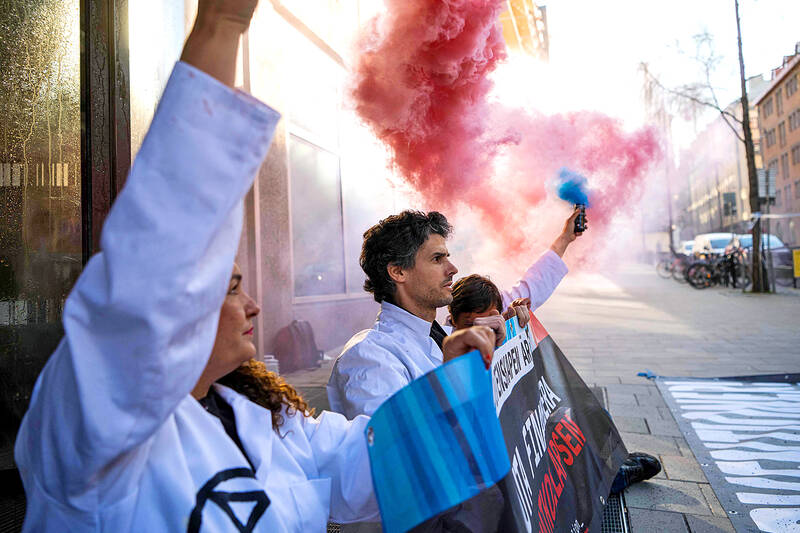Climate activists are using shareholders’ meetings to turn up the heat on corporations about their carbon footprints, from flooding them with questions to more colorful tactics such as singing or throwing cake at executives.
Last week’s Volkswagen AG (VW) shareholders’ meeting was particularly testy, with a cake landing on the podium where supervisory board member Wolfgang Porsche, who was celebrating his 80th birthday, was sitting.
Scientist Rebellion activists held up a sign slamming the emissions from the group’s vehicles. Another person took her top off in protest at the company’s operations in China’s Xinjiang region, where rights groups and the US say genocide is taking place.

Photo: AFP
“I wanted to go directly to the source of the car lobbies,” said Monika Krimmer, a 60-year-old psychotherapist who was one of the activists.
She held up signs and handed out flyers at the Berlin meeting.
In Paris on Tuesday, Scientist Rebellion members inundated BNP Paribas SA executives with questions about the European banking giant’s climate strategy — to the point of angering shareholders who hurled insults at the scientists.
However, BNP bosses answered the questions.
“Do not underestimate the targets we have set,” said BNP CEO Jean-Laurent Bonnafe, while refusing to draw a red line regarding firms that invest in new fossil fuel fields.
Earlier this month in London, HSBC Holdings PLC’s gathering was repeatedly interrupted by climate activists, with some demanding that the bank stop investing in fossil fuel companies and others accusing the firm of lying.
Fed up with the interruptions, executives asked that the activists be escorted out.
Days earlier, a group of activists disrupted the Barclays PLC meeting, changing the lyrics to a Spice Girls song to sing “stop funding fossil fuels and end this madness.”
Lorette Philippot, a campaigner at environmental group Friends of Earth, said shareholders’ meetings are where companies discuss their performance and make new pledges.
“So it’s our role as a counter-power to both tell the truth about their actions and prevent this annual display of greenwashing,” Philippot said, using the term for misleading climate pledges made by companies.
The meetings are also a chance to push companies to step up their climate ambitions, she added.
Activist actions at shareholders’ gatherings are nothing new — Greenpeace members rocked the meeting of French energy giant TotalEnergies SE in 2018, some hanging from the ceiling with signs reading “break free from oil.”
However, the “climate issue is rising in a somewhat radicalized way” with “more and more confrontations, sometimes violent,” said Benedicte Hautefort, cofounder of Scalens, a financial technology firm serving listed companies.
In the US, some corporations have avoided confrontation as they continue to hold virtual meetings, such as oil giants ExxonMobil Corp and Chevron Corp, and banking group JPMorgan Chase & Co.
“In a world where boards have precious little accountability, it’s a step backwards,” said Andrew Logan, senior director for oil and gas at Ceres, a nonprofit that works in favor of sustainability policies through capital markets.

Vincent Wei led fellow Singaporean farmers around an empty Malaysian plot, laying out plans for a greenhouse and rows of leafy vegetables. What he pitched was not just space for crops, but a lifeline for growers struggling to make ends meet in a city-state with high prices and little vacant land. The future agriculture hub is part of a joint special economic zone launched last year by the two neighbors, expected to cost US$123 million and produce 10,000 tonnes of fresh produce annually. It is attracting Singaporean farmers with promises of cheaper land, labor and energy just over the border.

US actor Matthew McConaughey has filed recordings of his image and voice with US patent authorities to protect them from unauthorized usage by artificial intelligence (AI) platforms, a representative said earlier this week. Several video clips and audio recordings were registered by the commercial arm of the Just Keep Livin’ Foundation, a non-profit created by the Oscar-winning actor and his wife, Camila, according to the US Patent and Trademark Office database. Many artists are increasingly concerned about the uncontrolled use of their image via generative AI since the rollout of ChatGPT and other AI-powered tools. Several US states have adopted

A proposed billionaires’ tax in California has ignited a political uproar in Silicon Valley, with tech titans threatening to leave the state while California Governor Gavin Newsom of the Democratic Party maneuvers to defeat a levy that he fears would lead to an exodus of wealth. A technology mecca, California has more billionaires than any other US state — a few hundred, by some estimates. About half its personal income tax revenue, a financial backbone in the nearly US$350 billion budget, comes from the top 1 percent of earners. A large healthcare union is attempting to place a proposal before

KEEPING UP: The acquisition of a cleanroom in Taiwan would enable Micron to increase production in a market where demand continues to outpace supply, a Micron official said Micron Technology Inc has signed a letter of intent to buy a fabrication site in Taiwan from Powerchip Semiconductor Manufacturing Corp (力積電) for US$1.8 billion to expand its production of memory chips. Micron would take control of the P5 site in Miaoli County’s Tongluo Township (銅鑼) and plans to ramp up DRAM production in phases after the transaction closes in the second quarter, the company said in a statement on Saturday. The acquisition includes an existing 12 inch fab cleanroom of 27,871m2 and would further position Micron to address growing global demand for memory solutions, the company said. Micron expects the transaction to